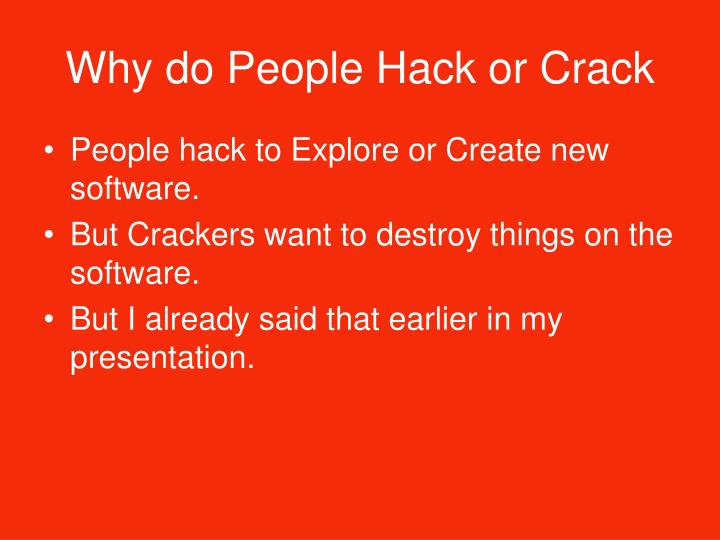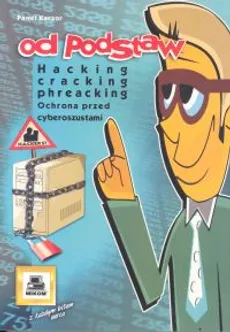- Cracking Definition Government
- Hacking And Cracking Definition
- Hacking And Cracking Definition Will Brown Play
In computer context Cracking is an unofficial change to a software that removes or changes something unwanted, such as a key, license or password requirement for use. May 20, 2017 Hacker V/S Cracker. Hackers; These are the peoples that may be referred to as the skilled masters in the department of hacking world, use their talents of pentesting, cracking structures, hacking the networks for the very cause of assisting a few enterprises or to locate the security vulnerabilities of any device which will make it more secure. The terms hacking and cracking refer to dichotomy of how individuals choose to respond to the exploitation of system vulnerabilities. Once, the term ‘hacking’ was used to define the activity of circumventing a computer ’s, or a network’s, security without authorization for reasons such as financial gain, corporate espionage, personal. Hacks and Cracks is most easily navigated with one of the newer graphical web browsers, such as Netscape Navigator 2.0 or 3.0 or Microsoft Internet Explorer 3.0.Other things to help you in your viewing pleasure: expand your browser to fill the whole screen, get a computer with at least 256 colors (16,000 colors better), get a 28.8 modem! The best opinions, comments and analysis from The Telegraph.
Sometimes the definition of a word changes over the years. For example, the word “fun” today means to have a good time or engage in an enjoyable activity. But in the 17th century the word actually meant, “to cheat or hoax.” When it comes to cybersecurity, imagine this principle only sped up with the whir of technology behind it.
On the internet, words and symbols change meaning almost daily. When it comes to the cybersecurity terms “hacker” and “cracker,” their meanings have evolved and changed a great deal over the years. Let’s take a look at where they got started and what the current state of these labels are.
Where Did the Terms Hacker and Cracker Originate?
It seems that most internet users are more familiar with the term “hacker” and indeed, it has quite a long history. The term started out at MIT in the 1950s. It originally meant to deal with a technical problem in a creative way without any negative connotations. By 1975, a jargon dictionary for computer programmers contained multiple definitions of the word with only one of them meaning a person who was up to no good. The final definition reads:
[deprecated] A malicious meddler who tries to discover sensitive information by poking around. Hence password hacker, network hacker. The correct term for this sense is cracker.
And now we run into the term “cracker.” Somewhat akin to safecracker. That term describes someone who gains entry to a safe without the use of the combination or a key.
Where do the “Hat” Hackers Come in?
You’ve probably heard the terms; white hat, black hat, etc. But what do these hat colors ultimately mean and what do they do? Let’s take a look.
- White Hat: These are the good hackers. They engage in ethical hacking. For example, a penetration tester, one type of white hat, might be hired by a company to try to break into their system. This is to test their digital realm for weaknesses that individuals might exploit.
- Black Hat: These are the stereotypical bad people. Their goals and methods may very, but a black hat hacker is someone who accesses digital information or accounts, which are not theirs. Some hackers commit these crimes for pranks or to embarrass users. Others want to steal money and personal information, which can be sold for a great deal on the darknet.
- Gray Hat: These hackers are neither white hats nor black hats, but somewhere in the middle. For example, a gray hat hacker might, break into a government agency’s computer system and then message them the details about weaknesses in their network. They have committed a crime by breaking into the system in the first place, but they used the information to help out the government agency.
What Does “Hacker” and “Cracker” Mean Today?
Although these terms continue to evolve, most cybersecurity experts choose to use the Hat definitions to describe hackers. The terms have changed over the years. This article from 2005 identifies crackers as the baddies who broke into systems and hackers as the good people who tried to keep them out and stop their attacks.


But in an ever-evolving digital world, there is little doubt that these terms might change again over the years. As the world becomes more reliant on computers and more and more information becomes digitized, there will be an increased need for cybersecurity. While there are black hats out there, there have to be white hats to keep the internet safe for users everywhere.

Are you interested in becoming one of white hat hackers who help keep businesses and organizations safe? If you want to earn a Bachelor of Science Degree in Computer and Information Science with a Major in Cyber and Network Security - Cybersecurity Track, consider ECPI University for the education you’ll need for to make a difference in your field. For more information about this program or any of the other cybersecurity programs, connect with a friendly ECPI University admissions advisor today.

It could be the Best Decision You Ever Make!
DISCLAIMER – ECPI University makes no claim, warranty, or guarantee as to actual employability or earning potential to current, past or future students or graduates of any educational program we offer. The ECPI University website is published for informational purposes only. Every effort is made to ensure the accuracy of information contained on the ECPI.edu domain; however, no warranty of accuracy is made. No contractual rights, either expressed or implied, are created by its content.
Gainful Employment Information – Cyber and Network Security - Bachelor’s
Cracking Definition Government
For more information about ECPI University or any of our programs click here: http://www.ecpi.edu/ or http://ow.ly/Ca1ya.
Hacking And Cracking Definition

Hacking And Cracking Definition Will Brown Play
View the discussion thread.
